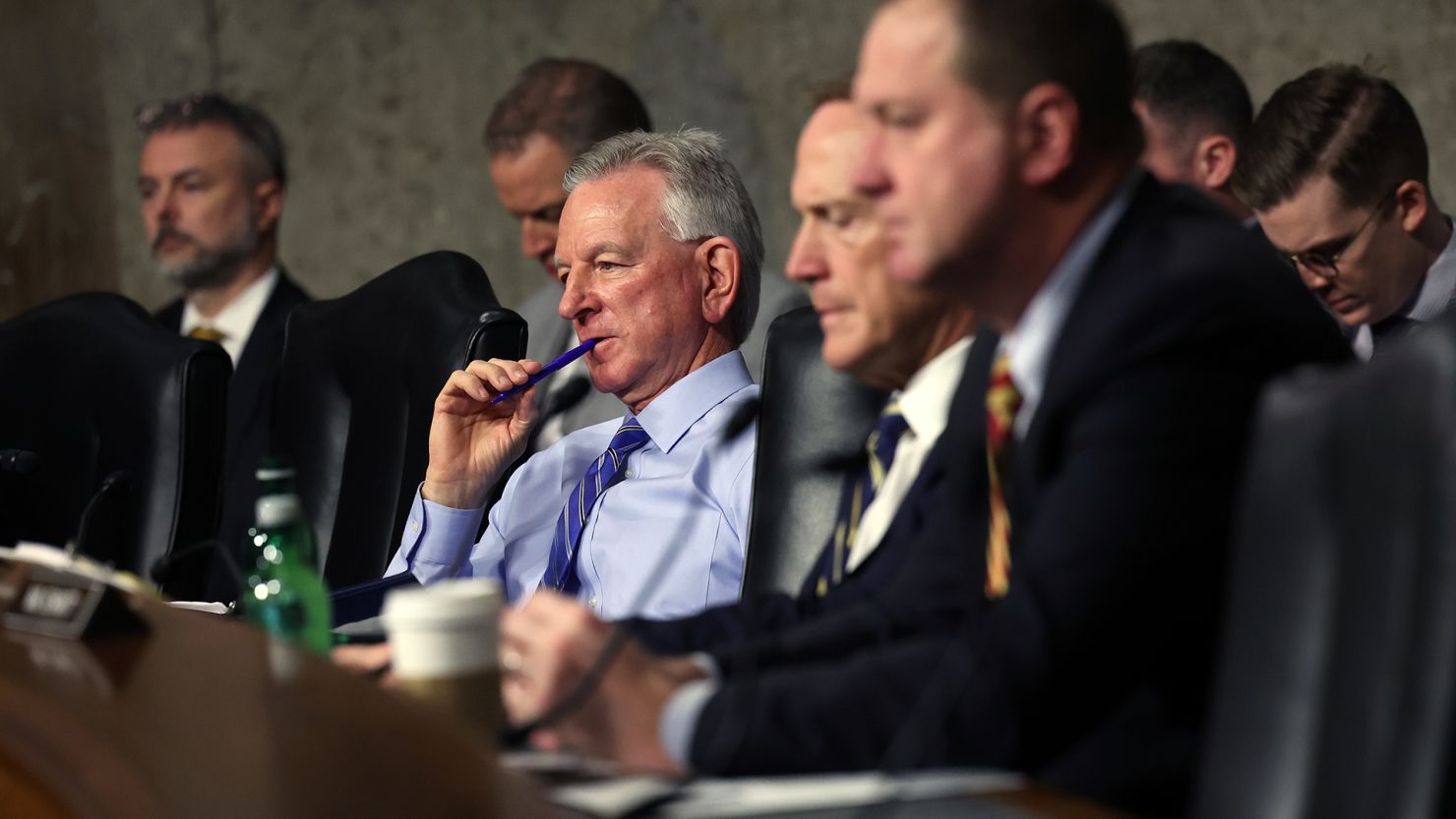The Defense Department is urgently working with lawmakers in hopes of resolving a hold on critical military nominations, including for some of the most senior ranking officers, as concerns inside the Pentagon grow about the potential impact on national security, defense officials told CNN.
Alabama Republican Sen. Tommy Tuberville has single-handedly blocked the nominations to protest new Pentagon policies ensuring service members have access to reproductive health care following the Supreme Court’s overturning of Roe v. Wade last year. Tuberville first threatened to put a hold on DOD nominees in December, and followed through in March.
Tuberville’s objection has thrown a wrench in what is usually a routine Senate maneuver in which hundreds of military nominations are confirmed all at once under a process known as unanimous consent. If Tuberville continues to hold out, the Senate would have to vote on hundreds of Pentagon nominations one at a time — a process that a Democratic Senate aide said could take a year to get through.
“This political showmanship could have a serious impact on our military readiness, on our military forces, and on our national security,” a National Security Council spokesman told CNN.
Holds on senior leadership
Among the more than 180 nominations pending right now are some of the military’s most critical positions, including the commanders of 7th Fleet, in the Indo-Pacific, and 5th Fleet, which is part of Naval Forces Central Command. It also includes the military representative to NATO, at a critical time with the war in Ukraine.
The Senate approves tens of thousands of civilian and military nominations every year.
In total, roughly 650 general and flag officers will require Senate confirmation by the end of the year, according to a senior defense official, including three of the four current military service chiefs, as well as chairman of the joint chiefs and the vice chief of staff of the Air Force.
“If this hold continues, the military is not going to have any” confirmed senior leaders, a Democratic aide said.
The National Security Council spokesman echoed similar concerns, saying a hold “deprives our forces of leadership.”
Three- and four-star positions would likely be filled by a second-in-command on a temporary basis, but a senior defense official said that the path forward would likely vary by service and job. Another defense official said it is still being determined what that would look like for some roles if Senate confirmation continued to be withheld.
Letters to Lloyd Austin
When the Supreme Court overturned Roe v. Wade last June, several states instituted so-called trigger bans on abortion access. Some of those states include sizeable military footprints, such as Texas, Tennessee, and Oklahoma.
A February Pentagon press release regarding the new policies said that service members “do not control where they are stationed,” and the new policies are meant to ensure that troops can “access non-covered reproductive health care regardless of where they are stationed.”
Defense Secretary Lloyd Austin defended the policies during a Senate Armed Services Committee hearing last week, arguing that withholding approval on recommendations for promotion “makes us far less ready than we need to be.”

Tuberville wrote in the Wall Street Journal this week that he would maintain his hold on nominations until the Pentagon “changes its policy and follows the Constitution.”
In March when Tuberville followed through on his pledge to hold the nominees, he said that other “than a couple of calls to my staff to ask whether I was serious,” Pentagon leadership “has yet to call me directly.”
“In the early going on this issue, Tuberville hardly received as much as a phone call from these guys,” a Republican Senate aide echoed.
The senior defense official told CNN that there was “early outreach” from the department, including Deputy Secretary of Defense Kathleen Hicks, with Senate Armed Services Committee staff and the personal office staff of committee members. Pentagon officials held “multiple meetings” with committee and personal staff last year, the official said, and made “themselves available for further follow-ups and briefings.”
Steven Stafford, a spokesman for Tuberville, told CNN that Tuberville has been sending Austin letters for nine months regarding the abortion policies, and that Austin “did not respond to [Tuberville] until two weeks ago.”
Tuberville has since spoken with Austin directly about the hold on nominees, according to a news release on March 22.
Impacting the ‘entire promotion pyramid’
The hold on nominations could have a considerable logistical impact on military officers and their families. A defense official explained that a general officer up for promotion into a new role cannot move themselves or their family to that new command without military orders to do so, and those orders are not cut until they are confirmed to take that new job.
“The entire promotion pyramid relies on the fact that those at the top retire or promote out of their positions,” said Katherine Kuzminski, director of the Center for a New American Security’s Military, Veterans, and Society program. “If this goes on for more than a couple of months, you affect the entire grade plate all the way down.”
Kuzminski also said that the fight is further politicizing the military, something that Tuberville and other Republicans in Congress have repeatedly raised as a concern in recent hearings with defense officials. Senators should be asking questions of the political appointees, Kuzminski said, not involving uniform leaders who “do not set the policy.”
“In some ways, this is sending the message to the general public that military leadership had a role in deciding this particular policy or any policy,” she said, “when in reality, they’re entrusted to enact the policy set forth by the politicals.”
CNN’s Natasha Bertrand contributed to this report.
